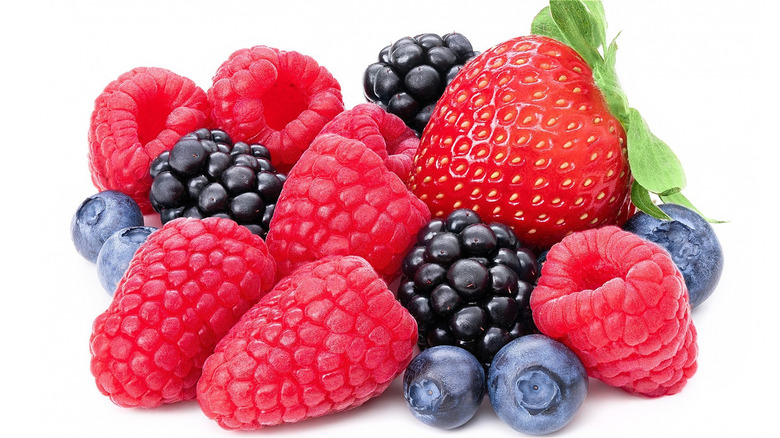Here's What Gives Berries Their Potentially Anti-Aging Properties
Most of us probably already know that berries are a healthy snack. While pretty much all fruits contain healthy vitamins and fiber, most berries, including raspberries, blueberries, and blackberries, may also pack an extra anti-aging punch into each serving, thanks to their antioxidants and free radical-fighting properties.
Free radicals are unstable molecules that are released as a part of normal cell function and then bind to other molecules in the body, thus disrupting their normal function, explains Very Well Health. This causes oxidative stress that damages the body's DNA, which may play a part in aging. However, some research has shown that consuming foods that are high in antioxidants may help neutralize these harmful free radicals, thus slowing the aging process and helping reduce the risk of disease and cell degeneration. "If these findings are borne out in further research, young and middle-aged people may be able to reduce risk of diseases of aging, including senility, simply by adding high-ORAC foods to their diets," explained former Agricultural Research Service Administrator Floyd P. Horn on the USDA website.
Berrries have a very high ORAC score
The National Institute of Health and Aging has devised a method for measuring a food's antioxidant capacity, known as the Oxygen Radical Absorbance Capacity, or ORAC, score. Consuming foods that have a high antioxidant capacity, such as berries, may be an effective way to slow the visible effects of aging.
"Free radicals attack the skin by increasing inflammation and breaking down collagen in the skin matrix. Consuming berries provides a way to fight free radicals and thus slow the signs of aging of both the body and the brain. Anthocyanin, a strong antioxidant compound in berries, gives them their beautiful, dark hue," Jaime Bachtell-Shelbert, RDN, LDN, founder of Wholly Nourished, explains to Mashed. "Blueberries (especially wild blueberries), blackberries, strawberries, and raspberries have some of the highest ORAC scores."
It's always a good idea to eat a generally healthy diet, including plenty of superfoods, and to avoid other oxidative stress-inducing activities such as smoking and excessive alcohol consumption. But anyone concerned about aging might also want to add a few extra servings of antioxidant-rich berries into their diet. But if you happen to hate berries, never fear — there are other ways to eat free-radical fighting antioxidants, too. Other foods with high ORAC scores include prunes, raisins, and leafy green vegetables such as kale, spinach, and Brussels sprouts, per the USDA.

